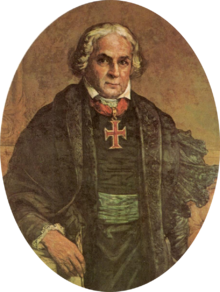Jose Bonifacio de Andrada e Silva
| José Bonifácio de Andrada | |
|---|---|
 |
|
| Secretary of State of the Empire Affairs Administrator of Rio de Janeiro |
|
|
In office 30 October 1822 – 17 July 1823 |
|
| Monarch | Pedro I |
| Preceded by | Marquess of Santo Amaro |
| Succeeded by | Marquess of Caravelas |
|
In office 7 September – 28 October 1822 |
|
| Monarch | Pedro I |
| Preceded by |
Himself as Secretary of State of the (...) |
| Succeeded by | Marquess of Santo Amaro |
| Secretary of State of the Kingdom Affairs | |
|
In office 16 January – 7 September 1822 |
|
| Monarch | João VI |
| Preceded by | Earl of Arcos |
| Succeeded by |
Himself as Secretary of State of the (...) |
| Minister of External Relations | |
|
In office 16 January 1822 – 16 July 1823 |
|
| Monarch |
João VI Pedro I |
| Preceded by | First to hold office |
| Succeeded by | Marquess of Caravelas |
| Personal details | |
| Born |
13 June 1763 Santos, São Paulo, Portuguese Colony of Brazil |
| Died | 6 April 1838 (aged 74) Niterói, Empire of Brazil |
| Parents | Bonifácio José Ribeiro de Andrada Maria Bárbara da Silva |
José Bonifácio de Andrada e Silva (13 June 1763 – 6 April 1838) was a Brazilian statesman, naturalist, professor and poet, born in Santos, São Paulo, then part of the Portuguese Empire. He was one of the most important mentors of Brazilian independence, and his actions were decisive for the success of Emperor Pedro I. He supported public education, was an abolitionist and suggested that a new national capital be created in Brazil's underdeveloped interior (effected over a century later as Brasília). His career as naturalist was marked by the discovery of four new minerals.
In 1800, Andrada e Silva was appointed professor of geology at Coimbra, and soon after inspector-general of the Portuguese mines; and in 1812 he was made perpetual secretary of the Sciences Academy of Lisbon (Academia das Ciências de Lisboa). Returning to the colony in 1819, he urged Dom Pedro I to resist the recall of the Lisbon court, and was appointed one of his ministers in 1821. When the independence of Brazil was declared, Andrada e Silva was made minister of the interior and of foreign affairs; and when it was established, he was again elected by the Constituent Assembly. He was also the author of the abolition project in Brazil, presented to the Constituent Assembly in 1823. But his democratic principles resulted in his dismissal from office in July 1823.
On the dissolution of the Assembly in November (the Night of Agony), he was arrested and banished to France, where he lived in exile near Bordeaux until 1829, when he was permitted to return to Brazil. But after being again arrested in 1833 and tried for intriguing on behalf of Dom Pedro I, he passed the rest of his days in retirement at the city of Niterói.
...
Wikipedia
